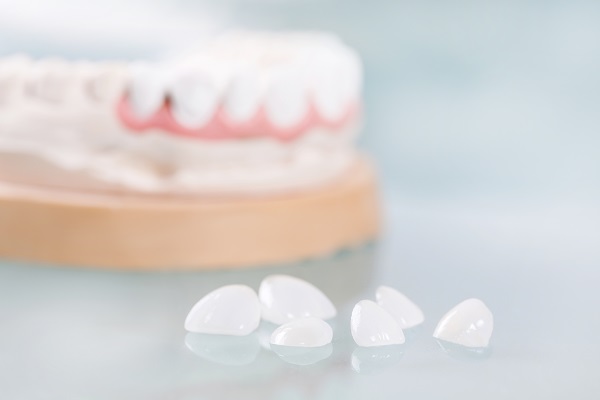Dental Veneers FAQs

Dental veneers are custom-made, thin shells fabricated from porcelain or composite resin and bonded on the teeth to enhance their appearance: color, size, length or shape. Veneers are a popular choice for transforming the smile. If you are considering dental veneers, it will help to learn as much as you can about the process.
Frequently asked questions
The following are answers to some commonly asked questions about dental veneers:
How many veneers are required?
During the initial consultation, the dentist will check the patient’s teeth to know if veneers are the best choice and how many will be required. It is better to place veneers in even numbers – two, four, eight or twelve – to produce the best results. Sometimes, six veneers are not advisable because any alteration to the canines without changing the premolars may look too conspicuous next to back row teeth and make the smile look less natural.
How long does the process take?
Once the dentist decides that veneers are the best option for the patient, the next stage is to prepare the teeth for veneers and take impressions. The next appointment (veneer bonding) happens after two or three weeks when the production of the custom veneers is complete.
What is the lifespan of dental veneers?
Veneers can survive up to 10 years of use without breaking or chipping. When they get proper care, they can last much longer. The veneers can develop issues prematurely if the patient fails to maintain their teeth properly. Dental professionals recommend regular cleanings and exams to keep the smile healthy and good looking.
What is the maintenance requirement?
Patients are encouraged to brush twice daily and floss to keep their teeth clean and free of plaque. People who are prone to clenching or grinding their teeth need to get a bite guard to protect their veneers. It is better to use an electric toothbrush. Patients also need to avoid eating hard foods or cracking hard substances with their teeth.
Why would the veneers need replacement?
The material used in making dental veneers is strong and should not break from regular use. However, gum recession (caused by gum disease) may expose the roots of the teeth. The dentist may recommend new veneers to cover the exposed roots.
Does getting veneers hurt?
The dentist may use a local anesthetic to numb the patient before starting the process. Once the numbness kicks in, the patient should not feel any pain throughout the procedure. If only two to four veneers are required, there should be no soreness or discomfort after the numbness wears off. For eight or more veneers, slight soreness or discomfort may occur. Over the counter pain relievers are usually enough to alleviate any discomfort.
What is the cost of getting veneers?
The cost of getting veneers depends on the dentist, the material used and the dental lab that will provide the veneers. The dentist’s cost usually covers the examination, x-rays, impressions and placement. Patients should discuss with their dentist to know the precise cost.
In conclusion
Veneers allow you to transform the appearance of your smile drastically. If you have more questions about the process, book an appointment with the dentist for information.
Request an appointment here: https://hemetdentalcenter.com or call Hemet Dental Center: Brian Stiewel DDS, INC. at (951) 707-4366 for an appointment in our Hemet office.
Check out what others are saying about our services on Yelp: Read our Yelp reviews.
Recent Posts
Tooth extraction is a common dental procedure where a dentist removes a tooth from its socket in the jawbone. While it may seem intimidating, these procedures are often necessary to maintain oral health and prevent further complications. Here are the two types of tooth extractions that dentists use to improve your smile and overall health.Simple…
A routine dental checkup serves as the foundation for preserving long-term oral health. While daily brushing and flossing provide essential home care, they cannot replace professional evaluations. A dental checkup helps detect early signs of decay, gum disease, or bite issues before they become advanced, painful, or costly. For patients of all ages, staying consistent…
Tooth extractions are common dental procedures performed by general dentists. They can be a result of decay, disease, or a fracture. While the dentist may introduce it to preserve oral health, it is important to know what to expect during and after the operation.There are two types of tooth extractions, namely simple and surgical. Most…
General dentists, like any dental professional, strive to help patients keep all of their natural teeth. However, tooth extraction may be the only solution when gum disease becomes severe. A dentist can perform this oral health-saving procedure and recommend options to restore fullness to a patient's smile.Gum disease, or periodontal disease, is an oral health…


